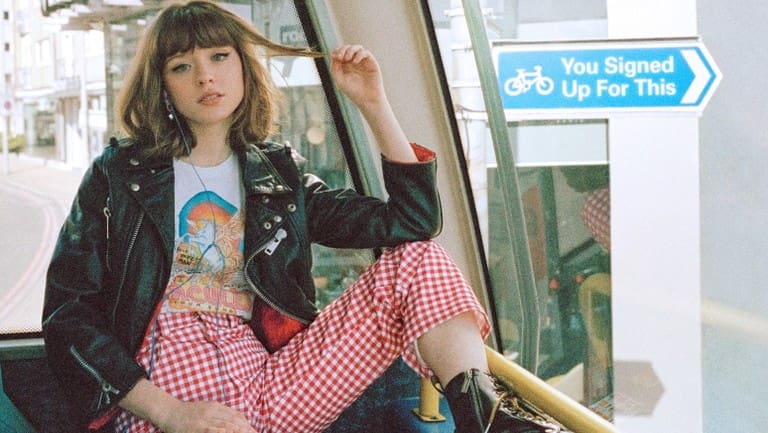“This wasn’t how it’s supposed to go/
I should be the one you’re dancing with /
Spinning with a Vodka Coke /
Everybody at my fingertips”
So opens the single “John Hughes Movie” from Maisie Peters debut album released in August, ‘You Signed Up For This’ – an ode to youth with refreshing images surrounding the novelties of clubbing, dancing, and an underlying fear of being vulnerable.
The long-distance girlfriend of our dreams, Peters (known by her fans as ‘Mazzie’) embodies the spirited next-door-neighbour persona and is guilty of romanticising her love life to a tee.
As a wannabe writer and casual storyteller who stumbled across her YouTube channel at the age of fifteen, I have marvelled at the way Peters has marked her place in the music industry, untarnished by the rising fame that has followed her since being contracted to a major record label. She remains a charming, word aficionado who shares a communal fleece sweater with her housemates and partakes in “psychologically unpacking every man” she’s ever met for the hell of it.
First performing in public at the age of 14 as a busker in the streets of Brighton and posting videos of original songs on YouTube, Peters’ musical success has since taken off and evolved from her acoustic folk roots to a funky, synth-filled sensibility in the pop world that insists on being played out loud in a car with the windows down while cruising on a highway.
The fantasies that adorn You Signed Up For This (YSUFT) (“late nights in the old arcade drinking cheap wine as Elvis plays” and dancing at parties on the living room floor) are stricken with casualties wielded by the double-edged-sword of wanting and touches on teenage angst and melodrama. Still, there is a remarkably untouchable earnestness that Peters occupies in her quipped stubborn realism that subverts the pining Nicholas Sparks/John-Hughes-like narrative that is affixed to the imaginative desires of young adults alike:
“I could see a bloodbath coming
Playing checkers as the flat was flooding
I wasn’t eating and you still said nothing
Better, should’ve known, should’ve known better”
– Love Him I Don’t
YSUFT echoes maladies of heartbreak in youth and traverses through the stages of teenage angst to adulthood featuring stories of elusive boyfriends, unrequited love, and softly simmering resentment.
Tussled against self-reflections on past relationships, hypothesising on the prospect of love and reclaiming individual agency, Peters writes with a candid take on life in your early 20s. With an arguably Swiftian-level break-up lyricism tied to her belt, Peters is a big fan of middle eights (a section of a song often seen as an interlude that has different melodies and lyrics) and her musical language is rippled in longer phrases with a stretch-to-fit-in-each-word in her songs.
The album opens with a playful remark espousing her trademarked drivers-licence-less-self (she has since passed her driving test on her fourth attempt) and points to her emotional state of mind as “probably upset right now.” Peters introduces her fans to a bold persona, one who is unabashedly self-assured, placing the onus of her flaws to the listener with the titular “You Signed Up For This.” She lays bare observations about herself, distinguished by features of finding shouting hard and being afraid of conflict, a 5’1 homebody who is too “obsessed with death to do any drugs” and cuts through the noise of her fears with a chorus that settles the nerves by removing the beats and bass line, slowing down and soothing listeners with her soft, vulnerable tone. This song is a time capsule for the apprehension of youth and placating fears by finding yourself and yearning to be better.
The next track, “I’m Trying, Not Friends” is a passive-aggressive anthem about breakups which sees Peters singing along to a snappy rhythmic drum beat in fast-paced fashion. Peters braces us for impact with breathless desperation and ushers us away from the slump of heartbreak and towards a space for breaking plates with our exes’ names written on them.
In ‘Villain’, Peters bookends a cold truth to those left with fragments of a relationship and offers a vantage point of the anti-hero or antagonist, funnelling a steel gaze into the subject of heartache. The palette of this song welcomes a mid-tempo, rich tapestry of percussion and a sharp synth, meditating on the casualties of love in retrospect. There is a poetic attraction to checking up on one’s past and Peters leaves her pride at the door when she’s “drunk” and “mean outside your house” – indulging in a series of uncomfortable moments at her own expense.
Maisie Peters writes for: serial blushers, those who never make it to second dates, hot girls scared of love who don’t have their driver’s licence, aspiring cottagecore individuals, jaywalkers, those who leave parties early, overthinkers, procrastinators, romantics who project their fantasies onto their local barista, seasonal existentialists, people pleasers, those who buy overpriced sweaters on a night out because they’ve left their jumper at home, candle-lovers, grudge-holders, eavesdroppers, the “text me when you get home” people, those who don’t believe in star signs and those who swear by them, non-committal lovers and the impassioned people who don’t know anything less than “all in”.
The music and lyricism in the album is nothing short of stunning. Her discography has kept me up on train lines, embraced me through heartbreaks and waived off restless summer afternoons. Peters possesses a rare quality that songwriters have where she can evoke a primal feeling of awe and urgency, cinching in on those quick scribble-these-thoughts-into-my-notes moments before they’re gone for good. She is my biggest bet on being the next household name and her snatched memorable lines have endeared me endlessly.





